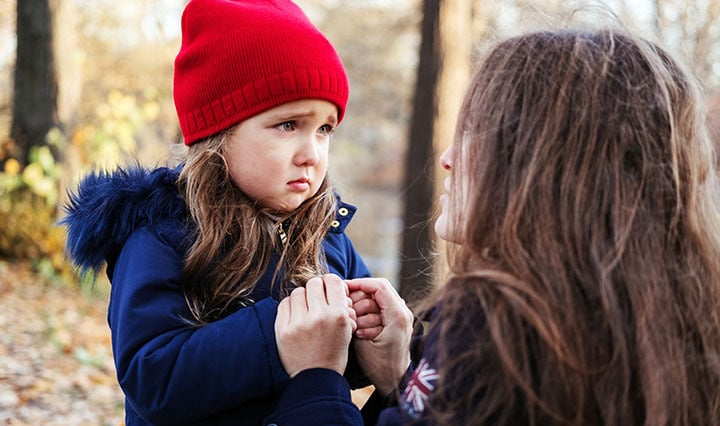
Imagine it: You’re at the store with your toddler, loading up on applesauce pouches and toilet paper when your sweet angel sinks their teeth into you without any warning (cue Jaws music.) You’re shocked, maybe angry, then panicked that your kid is headed for a life of troublemaking.
Before you sign them up for toddler bootcamp, take a breath and realize that biting and hitting are common among young children. Your kid is testing limits and attention-getting strategies, which is totally normal.
Why do kids hit or bite?
Hitting or biting doesn’t necessarily mean anything. As adults, we want to assign a meaning to all behavior, but it is more helpful to focus on what kids are trying to communicate with their actions and what purpose they are serving. With children (and adults), the primary functions of any behavior are to get something you want, to escape or avoid something you don’t want, to get the attention of others, or to do something just because it feels good.
Don’t believe these common myths about why kids hit or bite:
- The behavior is always purposeful. Truth: It's not.
- The child is spiteful. Truth: The child is not.
- The child will grow up to hurt others. Truth: They won't.
- The behaviors happen because you are a “bad parent” or you have a “bad child.” Truth: You are not a bad parent.
- Children with developmental differences bite for different reasons from other children. Truth: They don't.
Repeat after me: toddlers are not rational. Toddlers are not rational. Most of their behavior is just interacting with their world and seeing what happens. Try to remember that the next time they bite, hit, or throw a tantrum about bread crusts.
At what age does hitting or biting happen?
It is very typical for a child who is 2 or 3 years old to start hitting or biting to express frustration or to get something they want. Toddlers have more motor control than infants, but don’t yet have a lot of language to communicate what they need or want. Frustration is normal and to be expected. That doesn’t mean that it shouldn’t be addressed. If your child has a developmental difference, these behaviors may begin at a later age in line with their developmental age. They can also persist past these ages. No matter how old the child, it is most important to respond appropriately to their stage of development and the function of the behavior.
How should you respond?
Tips for what not to do:
- Do not hit or bite back.
- Try to not lose your cool.
- Do not get in their face.
- Do not spank.
- Try to avoid a lecture or talk a lot.
- Try teaching alternative behaviors while they are still upset, instead wait until they are calm. They can’t learn in a high-emotion state.
- Don't pay lots of attention to this behavior. Kids don’t care whether attention is positive or negative. Attention reinforces the behavior.
- Try to avoid giving an overly severe and totally unrelated consequence.
These things won’t help, and they might make it worse.
What to do instead
In the moment
- Give a short and sweet verbal correction like “no hitting” or “use gentle touch.”
- Provide an immediate consequence, usually removal of attention or desired item for a short period of time. Walk away briefly if needed.
- Model your own ability to tolerate frustration by remaining calm. Go to your mental “happy place” if you can.
- Don’t take it personally. If they could use another, easier and faster way to express themselves or get what they want, they would.
- Try to maintain a sense of humor about the absurdity of toddler logic. Remind yourself “this won’t last forever.”
- Signal a partner or other caregiver when you need a break and they need to step in.
- If they hit or bite another child, separate the children and be sure to provide adequate supervision to prevent it from happening again.
At other, calmer times
- Teach appropriate alternative behaviors that help them get their needs met.
- Help them learn words and other helpful ways to communicate (sign language, pictures, etc.).
- Praise them for any attempts to communicate difficult emotions.
- Practice “gentle touch” at times other than when the child is hitting or biting.
- Respond positively when they seek your attention in appropriate ways.
- Create the conditions for their best behavior: Make sure the child is not overly hungry, tired, or stimulated.
- Read books together about dealing with tough emotions.
- Practice self-care (sleep, exercise, etc.) to maintain a healthy state of mind.
- If the problem persists, enlist help from teachers, pediatricians and others invested in your child’s success.
Should you make kids apologize for hitting or biting?
That depends
- With a child as young as 2, forcing them to apologize doesn’t really teach them anything. It also may restart their tantrum cycle.
- With an older child who has the ability to understand others’ feelings, it is more appropriate to teach them to apologize. Taking responsibility for our actions is an important skill to learn. Allow the child to calm down before they apologize.
Remember
As much as we parents would love to find a cure-all for hitting and biting, that’s probably not going to happen. What we can do in the meantime is to try our best to remain calm, encourage positive behaviors and remember that this stage (and the bite marks) won’t last forever. We’re going to get through this. I believe in us.
